Recipients of the John H. Chapman Award of Excellence
Get inspired by the achievements of the recipients of the John H. Chapman Award of Excellence.
– Professor Emeritus James R. Drummond
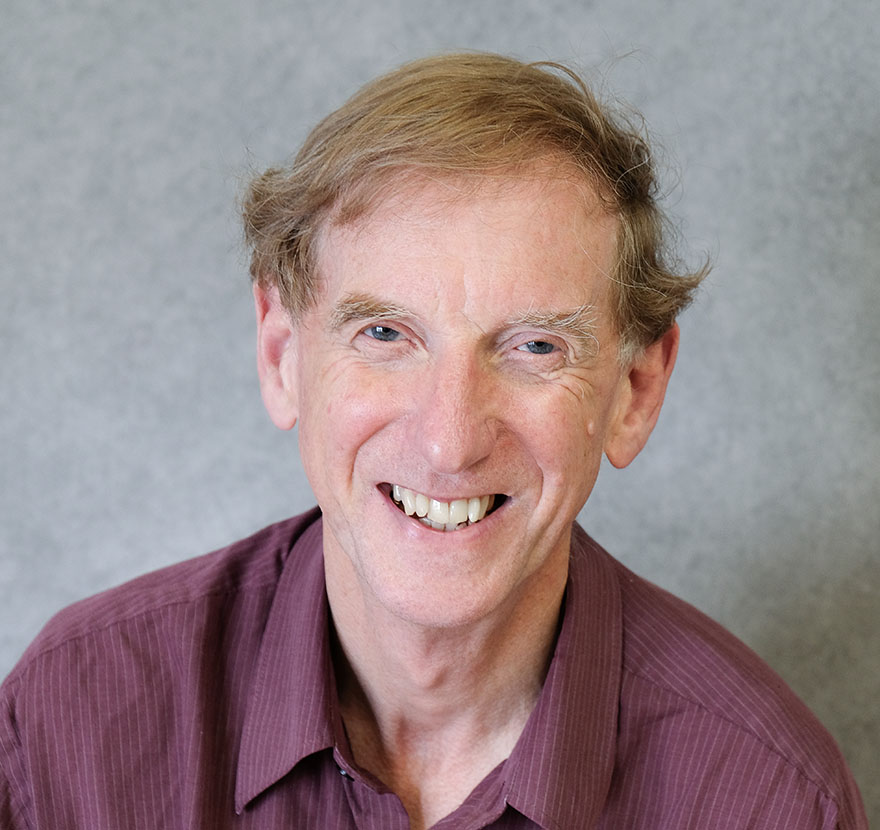
Professor Drummond has made many invaluable contributions to Canada's space program over the course of his career as a leading national and international space scientist. In , he joined the Physics Department at the University of Toronto, where he was a faculty member for 27 years. He then took on the role of Canada Research Chair in Remote Sounding of Atmospheres in the Department of Physics and Atmospheric Science at Dalhousie University. His lifelong work has allowed Canada to play an important role in understanding the causes of climate change, particularly in the Arctic.
Dr. Drummond is best known in the space community for his successful leadership as the Principal Investigator of the Canadian Measurement of Pollution in the Troposphere (MOPITT) instrument from conception to launch to more than 20 years in orbit. MOPITT launched on NASA's Terra satellite in . Its measurements of carbon monoxide enabled the first long-term global maps of carbon monoxide concentrations in the troposphere, led to over 500 publications, and helped advance our understanding of global pollution.
In addition to his extraordinary work with MOPITT, Dr. Drummond is Co-Investigator of the instruments on the Canadian SCISAT satellite; Principal Investigator of the Polar Environment Atmospheric Research Laboratory in Eureka, Nunavut; the founding president of the Canadian Network of Northern Research Operators; the Chair of the Forum of Arctic Research Operators; and the Canadian representative to several international organizations.
Nominated by Kimberly Strong, Chair, Department of Physics, University of Toronto
2018 – Virendra Jha
Dr. Virendra Jha has devoted his entire career of over four decades to the growth and success of the Canadian Space Program. He began working in the space sector in 1972 when he joined the Aerospace group of RCA Limited Montreal, which later became Spar Aerospace Limited, where he became Director of Engineering in 1988. Dr. Jha started working at the Canadian Space Agency in 1991, where he held various executive management positions (including Director General, Space Technologies; Vice-President, Science, Technology and Programs; and Acting President). He then came back to his technical roots as the Agency's Chief Engineering Adviser until he retired in 2014.
Dr. Jha's work in engineering and senior management led him to be part of almost every project and mission Canada has put into space: from the Canadarm, to Hermes, Anik and other satellite communications projects, Cassiope, RADARSAT-1 and 2, as well as the RADARSAT Constellation Mission. His technical and leadership contributions have been recognized nationally and internationally. He distinguished himself by developing technical innovations that led to reductions in both the size and cost of satellite systems, while enhancing their performance.
Nominated by Michel Giroux.
2016 – John B. Hutchings
Dr. Hutchings has led Canada's participation in landmark missions, like the James Webb Space Telescope, the Far Ultraviolet Spectroscopic Explorer, the International Ultraviolet Explorer, the Hubble Space Telescope and the Ultraviolet Imaging Telescope on India's ASTROSAT. These missions are helping make significant advances in space science and new technologies. The fact that he was able to lead so many major projects to fruition while maintaining excellent relations with international partners and a highly productive research career, is testimony to his skills, passion and perseverance.
Dr. Hutchings is indeed an enormously productive scientist who has made several major scientific discoveries. Authoring over 450 publications, he is in the top 0.5% of most cited astrophysicists worldwide. This is truly a remarkable personal achievement that reflects on Canadian science and innovation. As a true leader, he also generously shared his knowledge and served as a mentor to a generation of brilliant minds.
Nominated by Laura Ferrarese, Herzberg Institute of Astrophysics, National Research Council Canada
2012 – William MacDonald Evans

A 34-year veteran of Canada's Federal Public Service, Mr. Evans was the key architect of the Canadian Space Program. As such, he led the development of the 1985, 1994 and 1999 Space Plans that defined and obtained approval for the Canadian Space Program and worked on the legislation for the creation of the Canadian Space Agency (CSA). President of the CSA from 1994 to 2001, Mr. Evans was also instrumental in spearheading the development of the Canadian Astronaut and RADARSAT programs, and negotiating Canada's role in the International Space Station (ISS) and a number of international agreements which are the foundation of our current international partnerships.
Mr. Evans has had a long and illustrious career involving significant contributions to several areas including satellite communications, government policy, public administration and international relations. Since his retirement from the Public Service, he has pursued an active role as a consultant, offering services to government, industry and academia, and remains a strong supporter of Canada's space sector.
Nominated by Mag Iskander, MDA Information Systems Group; Iain Christie, NEPTEC; Michael Play, COM DEV International Ltd.
2011 – Henry Buijs
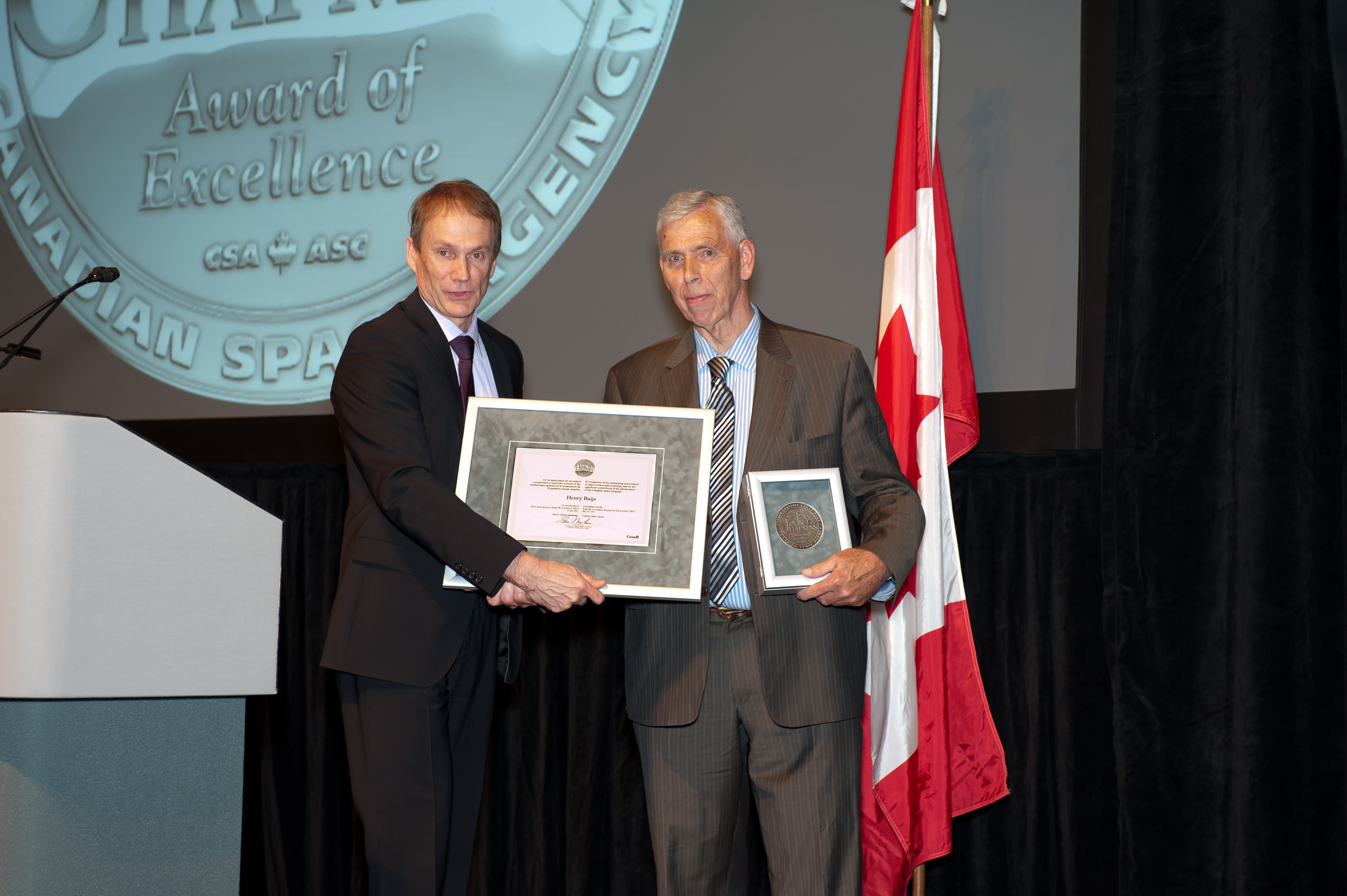
Dr. Henry Buijs is one of the original founders of Bomem in Quebec City, a high-technology, internationally recognized company now part of the ABB group. As a scientist, Henry Buijs established Fourier transform spectroscopy as a powerful technique and a core Canadian expertise used for the monitoring of the atmosphere from space. Dr. Buijs also contributed, in 1962, to the first balloon-borne measurement of night time atmospheric airglow. Fifty years later, CSA's SCISAT-1 is making major contributions to the understanding of the ozone using the same measurement technique.
As of 2011, Dr. Buijs continues to supervise development projects as Chief Technology Officer at ABB's Analytical Measurement business unit.
Nominated by Jacques Giroux, ABB Group
2010 – David A. Golden
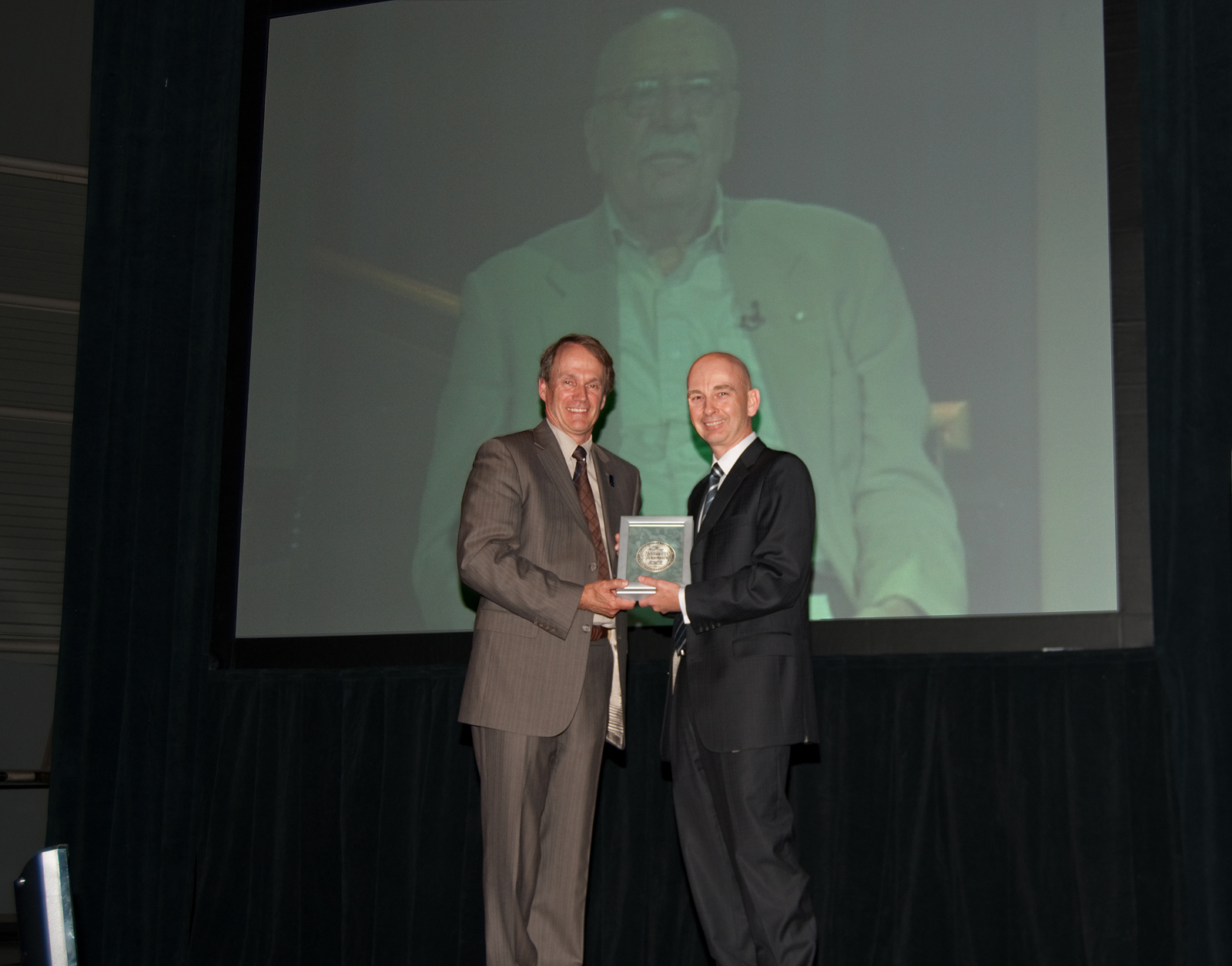
David A. Golden has a distinguished 48-year career as a public servant and business executive in the satellite and telecom industry in Canada. A key achievement and highlight of his career was bridging the worlds of government and business and helping them work together better for the benefit of Canadians and Canada's telecom industry.
Mr. Golden enjoyed a meteoric rise in government. Three years after joining the Civil Service, he became Deputy Minister of Defence Production and, subsequently, Deputy Minister of Industry. Through the 1960s, Golden chaired the Parliamentary Centre for Foreign Affairs and Foreign Trade, served as President of the Canadian Institute of International Affairs, and was the Chairman of the Board of Carleton University. In 1969, he helped to establish Canada's domestic satellite company, Telesat Canada, first as President and later as Chairman.
Nominated by Daniel Goldberg, Telesat; T. Gregory Kane, Stikeman Elliott
2007 – Peter C. Hughes
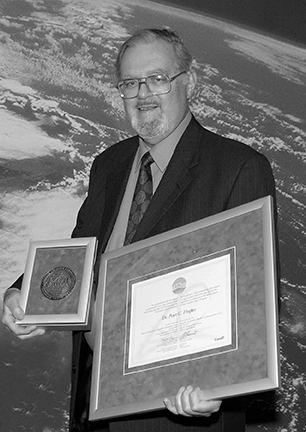
As an engineer, researcher, educator, author and entrepreneur, Dr. Hughes has had a tremendous impact on Canadian space technology and international space science. As a graduate student, his work for the Alouette program was the foundation of an extraordinary career. In the 1970s, he was involved with the development of the Space Shuttle's Canadarm, and Canadarm2 and Dextre for the ISS. Dr. Hughes also founded Dynacon Inc. The company specializes in satellite construction and control systems and led the development of the CSA's powerful astronomy microsatellite MOST. A Professor Emeritus of Space Systems Engineering at the University of Toronto, Dr. Hughes supervised over 80 postgraduate students, thus enhancing the talent and ingenuity of the Canadian space community.
Nominated by Dr. Anthony A. Haasz, Professor, University of Toronto for Aerospace Studies (UTIAS), and Dr. Bernard Etkin, Professor Emeritus, UTIAS
2006 – Allan I. Carswell
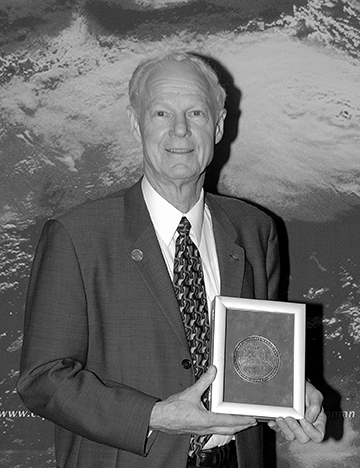
Dr. Carswell's groundbreaking work perfecting the lidar technology, which uses laser light pulses to precisely measure distances and diagnose components of the atmosphere, has gained wide recognition in the global scientific community. Chairman of Optech, Dr. Carswell founded the company in 1974 to develop commercial systems based on lidar technology. Dr. Carswell is the Canadian co-investigator on the Phoenix Science team for the meteorological station (MET) that will be placed on Mars in 2007.
Nominated by Bob McDonald, Quirks and Quarks, CBC Radio
2005 – John D. Macnaughton
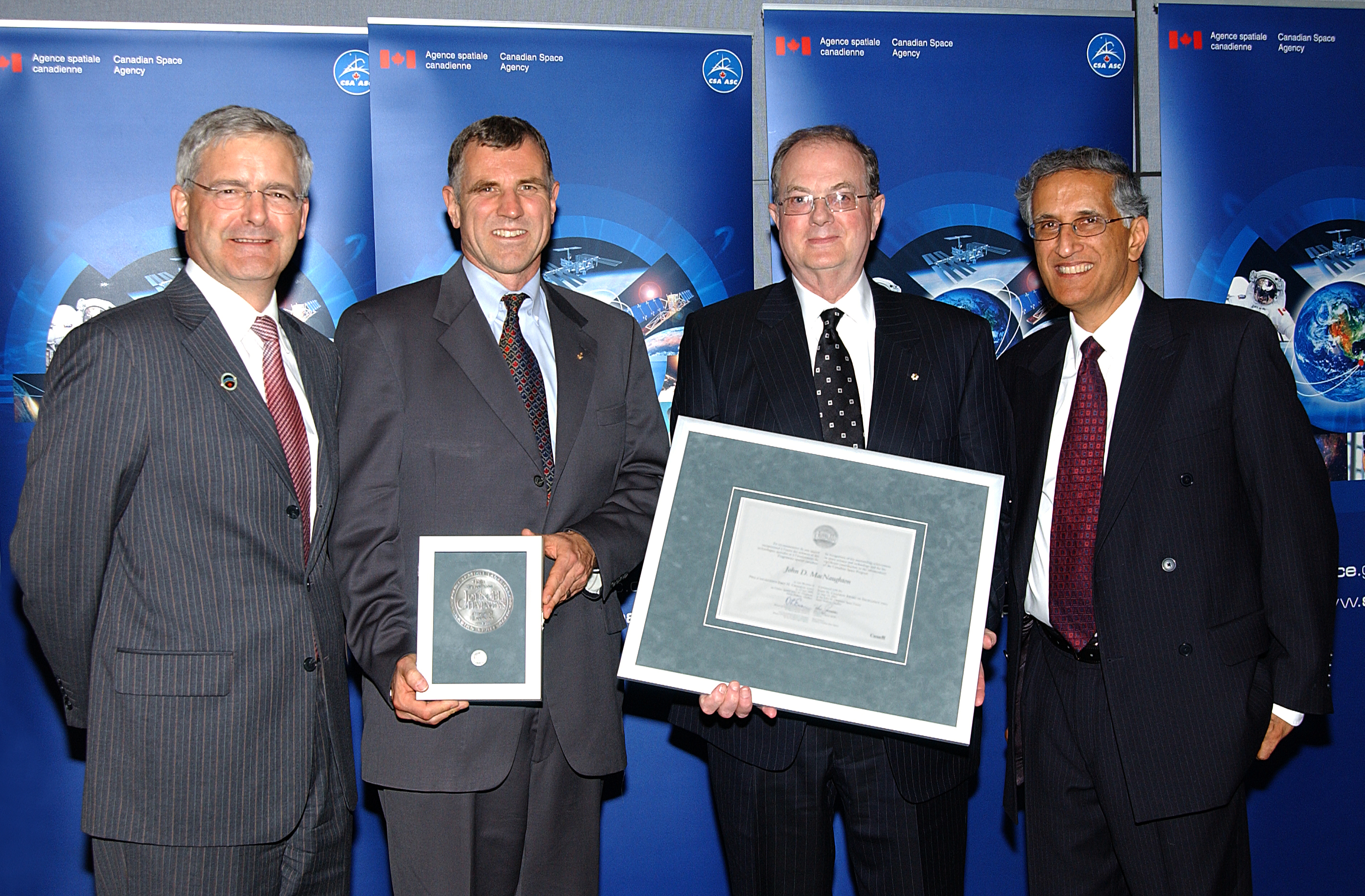
As president and CEO of SPAR from 1989 to 1996, Mr. MacNaughton led the company through innovative projects such as Canadarm, Anik E, MSAT, and RADARSAT-1. He is respected throughout the space community for his broad understanding of the value of space-based solutions in achieving Canada's objectives in communications, Earth observation and resource management, sovereignty and security, and international partnerships. This vision has been a major contribution in developing and applying national space policy.
Nominated by Ken Mackay, President, Policy Insights Inc.
2004 – Larry Clarke
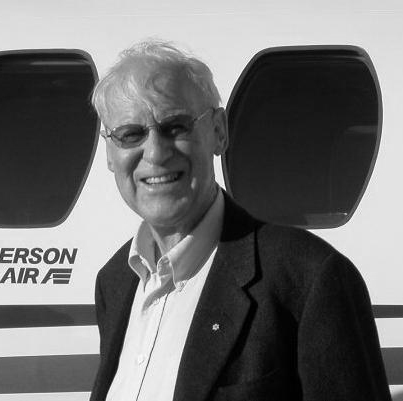
As founder of SPAR Aerospace, Larry Clarke's courage, determination, and vision were instrumental in advancing the commercial aspect of the Canadian Space Program. SPAR developed Canadarm, one of this country's most recognized technological achievements. Successful projects, such as Canadarm, the Communications Technology Satellite, and RADARSAT, testify to Clarke's entrepreneurial abilities and his tenacity as a businessman who, despite adversity, recognized the potential of a space industry that benefits all Canadians.
Nominated by Sherry Draisey, President, Good Vibrations Engineering Ltd.
2003 – Gordon G. Shepherd

Professor Emeritus of Space Science at York University, Dr. Shepherd contributed to Canada's space community for 40 years and championed the ISIS program, WINDII, and SWIFT. He pioneered developments of new techniques for instruments and data analysis to help maintain Canada's pre-eminence in thermospheric physics and position the Canadian Space Program internationally. He is a role model for Canadian atmospheric physicists and space scientists.
Nominated by Suzanne Hurtubise, Deputy Minister, Environment Canada
2002 – Colin A. Franklin
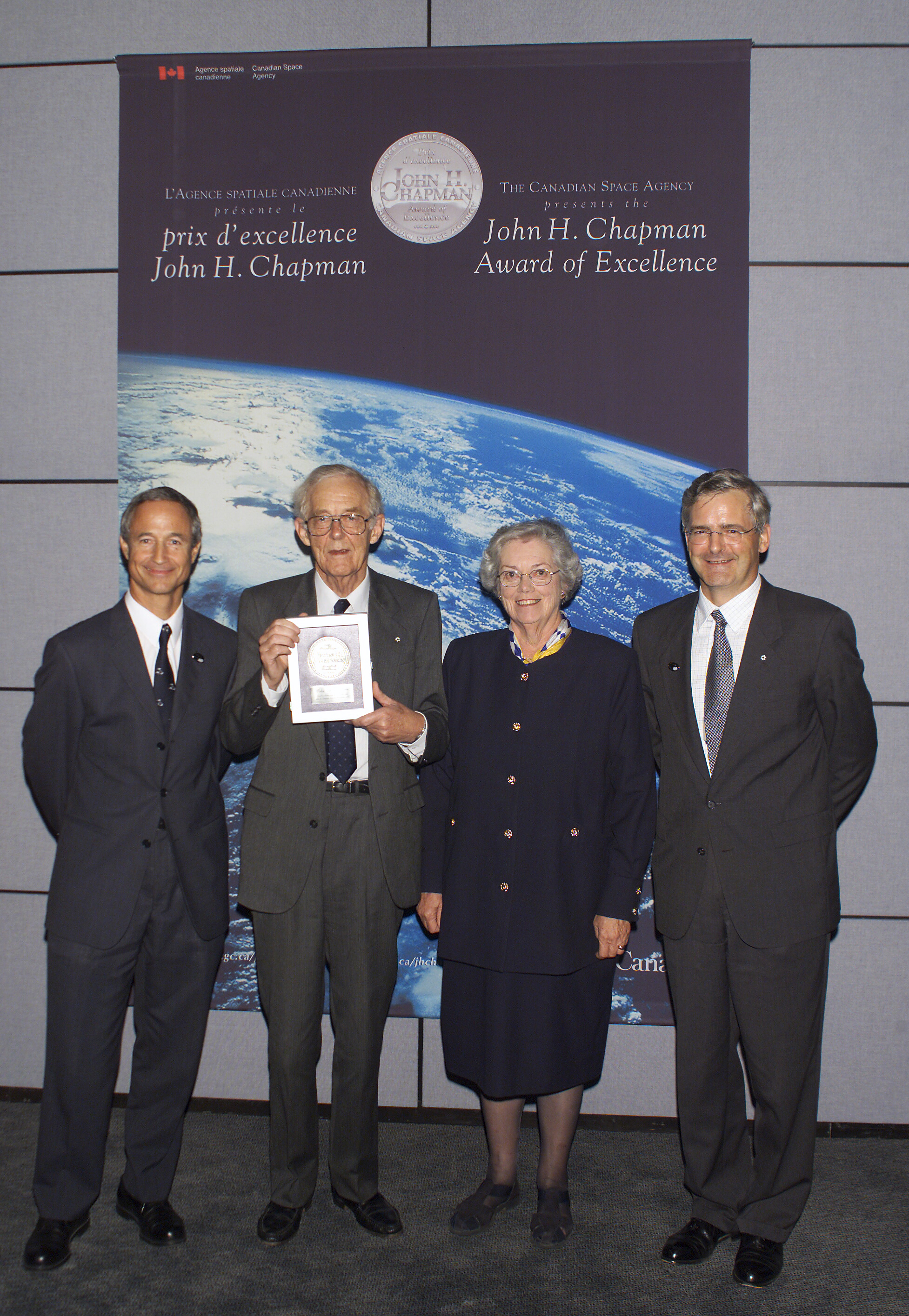
From the start of the Canadian Space Program, which began with the Alouette satellite project, and throughout his career, Colin A. Franklin is recognized as a remarkable scientific and engineering leader. Alouette's success is one of Canada's ten outstanding engineering achievements of the last 100 years. This accomplishment is due in great part to Franklin, who was the Chief Electrical Engineer on this program.
Nominated by Gerry Turcotte and Jack Rigley, Communications Research Centre Canada
2001 – Valentine O'Donovan
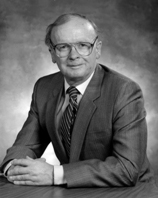
Founder of COM DEV International Ltd., the largest Canadian-based and globally recognized designer, manufacturer, and distributor of space and ground-based wireless communications products and subsystems; O'Donovan was Chairman of COM DEV until he retired in December 2004 and served as Chancellor of the University of Waterloo between 1997 and 2003. He was named a Member of the Order of Canada in 2003. His leadership, expertise, and commitment to excellence have inspired colleagues in the Canadian space industry for over 30 years.
Nominated by Mike McIntosh, Assistant Deputy Minister, Business New Brunswick
2000 – John Spencer Macdonald
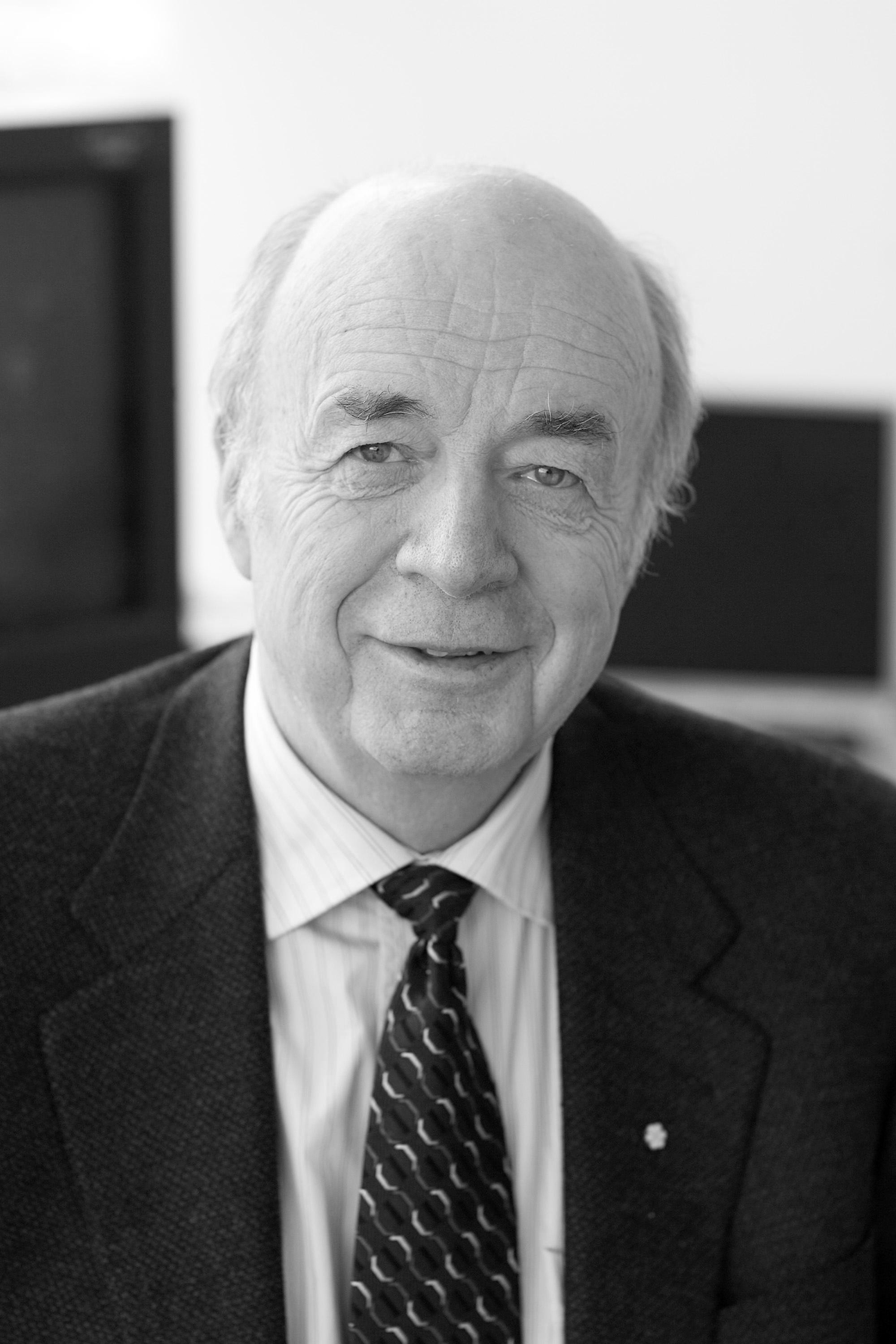
Dr. MacDonald's passion, dreams, and commitment have contributed to the shaping of the Canadian Space Program for 30 years. In 1969, Dr. MacDonald cofounded the firm MacDonald, Dettwiler and Associates, now MDA, which he headed until 1998. As advisor to government and as a member of the Science Council of Canada and the National Research Council of Canada, among others, Dr. MacDonald has helped position Canada as a world leader in many fields of space science and technology.
Nominated by Steve Kirchgessner, Director of Business Development, MDA
- Date modified:

